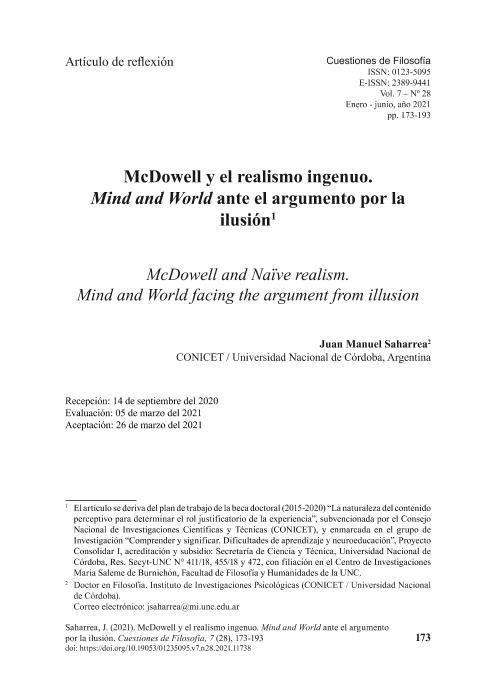Mostrar el registro sencillo del ítem
dc.contributor.author
Saharrea, Juan Manuel

dc.date.available
2022-03-12T01:10:45Z
dc.date.issued
2021-04-29
dc.identifier.citation
Saharrea, Juan Manuel; McDowell y el realismo ingenuo: Mind and World ante el argumento por la ilusión; Universidad Pedagógica y Tecnológica de Colombia; Cuestiones de Filosofía; 7; 28; 29-4-2021; 173-193
dc.identifier.issn
0123-5095
dc.identifier.uri
http://hdl.handle.net/11336/153284
dc.description.abstract
Mediante el análisis conceptual el artículo reconstruye algunos aspectos de Mind and World de John McDowell, orientados a ampliar el rol explicativo de la tesis de la “carencia de límites de lo conceptual”. Para esto se vincula dicha tesis, que corre el riesgo de ser objeto de la objeción de idealismo en sus variantes “más perniciosas”, con la idea de percepción como “apertura al mundo”, que niega decididamente un idealismo semejante. Si bien la defensa del rol justificatorio del contenido perceptivo da cuenta de esta última tesis, no muestra, al menos explícitamente, relaciones posibles con la primera. Este artículo, en cambio, propone resolver esta tensión. Así reconstruye la posible respuesta del conceptualismo de McDowell al argumento por la ilusión. De este modo, a partir de la distinción entre posibilidad ordinaria de error perceptual y posibilidad en principio de error perceptual –derivada del tratamiento de McDowell sobre la incorregibilidad perceptual– se concluye que la “carencia de límites de lo conceptual” y la afirmación de que ordinariamente la percepción nos proporciona conocimiento directo de hechos del mundo, no son incompatibles desde la perspectiva de la posibilidad ordinaria.
dc.description.abstract
This article rebuilds, through conceptual analysis, some of the aspects in Mind and World of John McDowell aimed at broadening the explanatory role of “the unboundedness of the conceptual” thesis. In order to achieve this, the aforesaid thesis –which runs the risk of being object of the idealism’s objection in its “most pernicious” variants has been connected with the idea of perception as “openness to the world”– which decidedly denies a similar idealism. Although the defense of the perceptual content’s justifying role acknowledges this last thesis, it does not show possible connections with the first one (at least, not in an explicit way). This article, on the contrary, aims at easing this tension, thereby rebuilding McDowell conceptualism’s answer to the argument from illusion. Thus, the conclusion drawn from the distinction between the ordinary possibility of the perceptual error and possibility in principle (of perceptual error) –derived from McDowell’s treatment of perceptual incorrigibility– is that “the unboundedness of the conceptual” and the assertion that perception provides us with direct knowledge of the world’s facts are not incompatible under the perspective of the ordinary possibility.
dc.format
application/pdf
dc.language.iso
spa
dc.publisher
Universidad Pedagógica y Tecnológica de Colombia
dc.rights
info:eu-repo/semantics/openAccess
dc.rights.uri
https://creativecommons.org/licenses/by-nc-sa/2.5/ar/
dc.subject
MCDOWELL
dc.subject
REALISMO
dc.subject
MENTE
dc.subject
MUNDO
dc.subject.classification
Otras Humanidades

dc.subject.classification
Otras Humanidades

dc.subject.classification
HUMANIDADES

dc.title
McDowell y el realismo ingenuo: Mind and World ante el argumento por la ilusión
dc.title
McDowell and Naïve realism: Mind and World facing the argument from illusion
dc.type
info:eu-repo/semantics/article
dc.type
info:ar-repo/semantics/artículo
dc.type
info:eu-repo/semantics/publishedVersion
dc.date.updated
2021-12-03T19:26:18Z
dc.identifier.eissn
2389-9441
dc.journal.volume
7
dc.journal.number
28
dc.journal.pagination
173-193
dc.journal.pais
Colombia

dc.journal.ciudad
Tunja
dc.description.fil
Fil: Saharrea, Juan Manuel. Universidad Nacional de Córdoba. Instituto de Investigaciones Psicológicas. - Consejo Nacional de Investigaciones Científicas y Técnicas. Centro Científico Tecnológico Conicet - Córdoba. Instituto de Investigaciones Psicológicas; Argentina
dc.journal.title
Cuestiones de Filosofía
dc.relation.alternativeid
info:eu-repo/semantics/altIdentifier/url/https://revistas.uptc.edu.co/index.php/cuestiones_filosofia/article/view/11738
dc.relation.alternativeid
info:eu-repo/semantics/altIdentifier/doi/https://doi.org/10.19053/01235095.v7.n28.2021.11738
Archivos asociados
